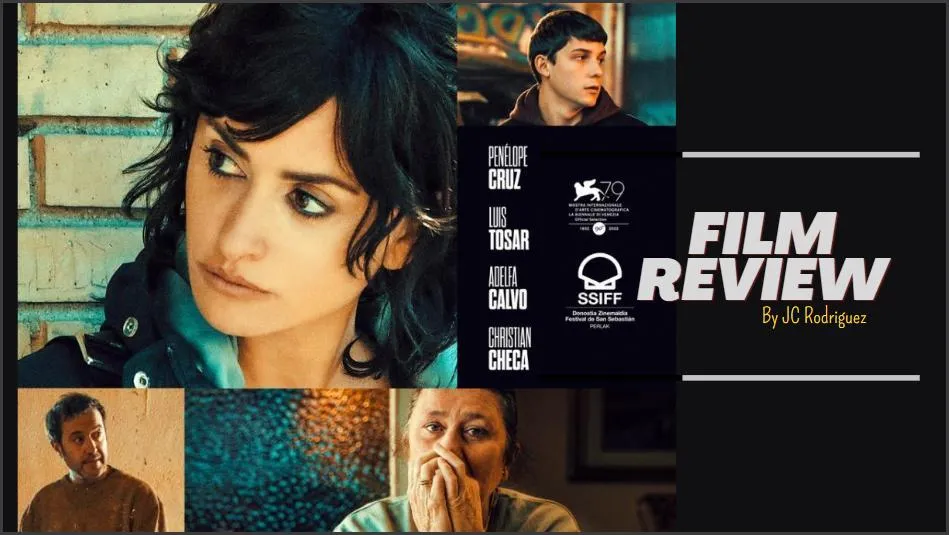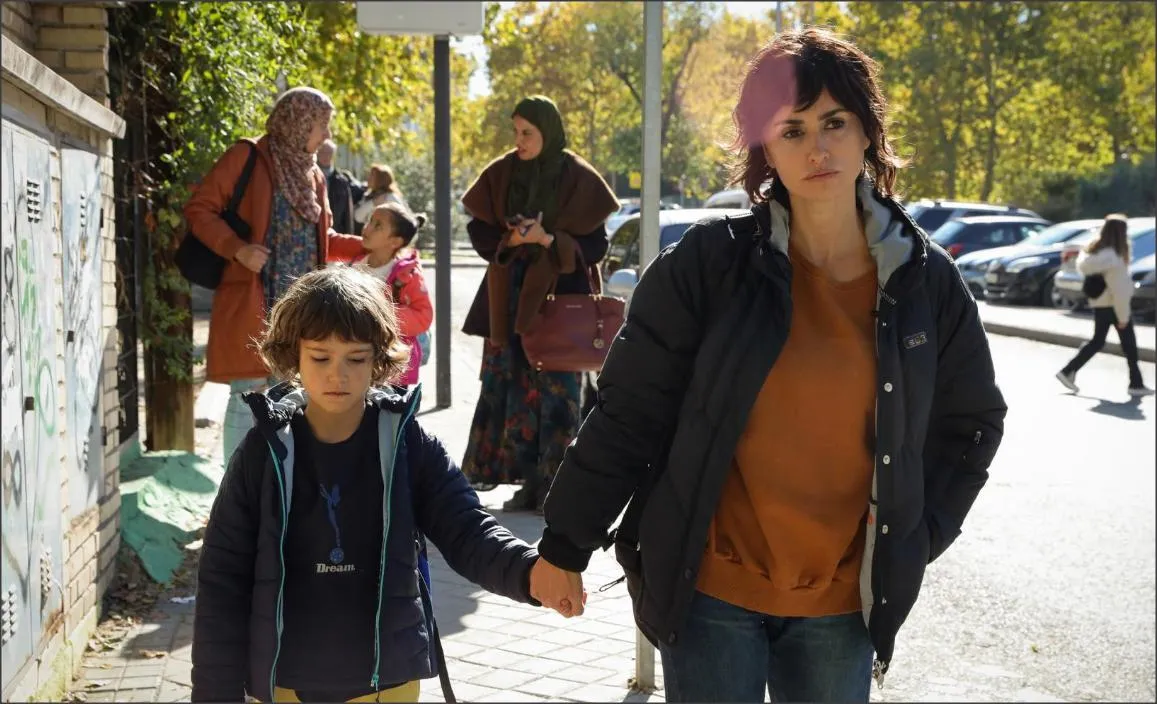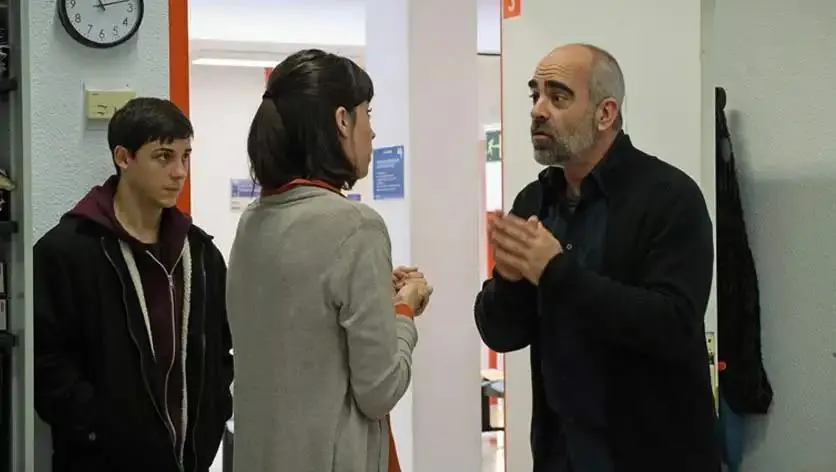Spanish social drama directed by the also actor Juan Diego Boto, so that we pay attention to the evictions and other socioeconomic problems that affect that country, but that does not mean that other parts of the world feel identified because their societies are also afflicted by similar problems.
Drama social español dirigido por el también actor Juan Diego Boto, para que prestemos atención a los desahucios y otros problemas socioeconómicos que afectan a ese país, pero que no significa que otras partes del mundo se sientan identificadas porque sus sociedades también se ven aquejadas por problemas similares.


The world is globalized, each nation has its own culture, but something that affects thousands of citizens, regardless of the country, are the economic problems that also end up influencing the environment where they live and especially in the family nucleus.
It is clear that the filmmaker wants to highlight the family and how it can be destroyed by economic problems. This is what I felt when I saw that most of the relationships shown in the film, whether between couples or between a son and his mother, are weakened.
How many marriages have ended due to stress caused by economic problems? How does an impending eviction affect a child's life? People find themselves emotionally collapsed in the midst of situations where there seems to be no solution, life is hard and human beings show less and less empathy towards others.
Empathy. Something we are losing. I am honest, I include myself among those people who can sometimes be indifferent to the misfortune of others. I think we have all at some point looked the other way, either because we are also with many problems. Many times we can be like that without realizing it and that is why this kind of films are important to make us reflect on ourselves, our environment and our behavior in the face of similar events.
El mundo está globalizado, cada nación tiene su propia cultura, pero algo que afecta a miles de ciudadanos, independientemente del país, son los problemas económicos que también acaban influyendo en el entorno donde viven y sobre todo en el núcleo familiar.
Está claro que el cineasta quiere poner de relieve a la familia y cómo puede ser destruida por los problemas económicos. Esto es lo que sentí cuando vi que la mayoría de las relaciones que se muestran en la película, ya sea entre parejas o entre un hijo y su madre, se debilitan.
¿Cuántos matrimonios han terminado debido al estrés causado por los problemas económicos? ¿Cómo afecta a la vida de un niño un desahucio inminente? Las personas se encuentran emocionalmente colapsadas en medio de situaciones en las que parece no haber solución, la vida es dura y los seres humanos muestran cada vez menos empatía hacia los demás.
La empatía. Algo que estamos perdiendo. Soy sincero, me incluyo entre esas personas que a veces pueden ser indiferentes ante la desgracia ajena. Creo que todos en algún momento hemos mirado para otro lado, bien porque también estamos con muchos problemas. Muchas veces podemos ser así sin darnos cuenta y por eso este tipo de películas son importantes para hacernos reflexionar sobre nosotros mismos, nuestro entorno y nuestro comportamiento ante hechos similares.



Botto has co-written the script with Olga Rodríguez and they have constructed a choral story where three main stories are intertwined and there are small sketches of secondary plots that serve as testimonies of the economic vicissitudes suffered by a large sector of Spanish society, where there is no distinction, they are problems that affect both those born in that country and immigrants trying to make a new life.
With a pace that seeks to bring the viewer into the lives of the characters in a period of 24 hours crucial to the future of each of them, using the resource of handheld camera to bring almost documentary realism to the narrative. I liked this decision, I think these are issues that should be shown as realistically as possible, or maybe I liked it because we Latin Americans are more accustomed to this type of social denunciation cinema.
Azucena is a mother of a child to take care of, she is fighting to stop the eviction order that will take place in 24 hours. She is on the edge, desperate, waiting for a miracle, mobilizing among organizations formed by others who have suffered the same problem and where support is provided. She has obtained help from strangers, while her own husband, Manuel, is distant, either because he is ashamed of not being able to solve the problem or because he must go to work in low-paying temporary jobs to survive. It is a portrait of a family broken by economic problems.
These characters are played by Penélope Cruz and the same director Juan Diego Botto, it is worth saying that both share one of the best sequences of the film, a discussion where each one shines with his talent and that many can easily identify, because they are a couple who love each other, but extreme situations sometimes make us say words that hurt deeply.
Botto ha escrito el guion conjuntamente con Olga Rodríguez y han construido una historia coral donde se entrelazan tres historias principales y hay pequeños bosquejos de tramas secundarias que sirven como testimonios de las vicisitudes económicas que padece un gran sector de la sociedad española, donde no hay distinción, son problemas que afectan tanto a nacidos en ese país como inmigrantes que intentan hacer una nueva vida.
Con un ritmo que busca meter al espectador en la vida de los personajes en un lapso de 24 horas cruciales para el futuro de cada uno de ellos, usando el recurso de cámara en mano para aportar realismo casi documental a la narración. A mí me ha gustado esta decisión, creo que son temas que deben ser mostrados de la forma más realista posible, o quizás me gusto porque los latinoamericanos estamos más acostumbrados a este tipo de cine de denuncia social.
Azucena es una madre de un niño que atender, ella está luchando para que se detenga la orden de desahucio que se efectuara en 24 horas. Se encuentra al límite, desesperanza, esperando por un milagro, movilizándose entre las organizaciones conformadas por otros que han sufrido el mismo problema y donde se bridan apoyo. Ella ha obtenido ayuda de desconocidos, mientras su propio esposo, Manuel, se muestra distante, ya sea por vergüenza a no poder solucionar el problema o porque debe ir trabajar en empleos temporales mal pagados para sobrevivir. Es el retrato de una familia rota por los problemas económicos.
Estos personajes son interpretados por Penélope Cruz y el miso director Juan Diego Botto, valga decir que ambos comparten una de las mejores secuencias del film, una discusión donde cada uno brilla con su talento y que fácilmente muchos se pueden identificar, porque son una pareja que se quiere, pero las situaciones extremas a veces nos hacen decir palabras que hieren profundamente.


Rafael is a lawyer who is dedicated to social causes, a character somewhat idealized, because there are few lawyers who do not care about money and are dedicated to work for free and even to get involved with strangers, to the point of helping them in matters as personal as providing them with a gas cylinder. It is with this character with whom we will live the most frenetic moments of the film, always in constant movement, he must do many things in different parts at the same time. Focused so much on work and helping others, he has neglected his family relationship.
Helena is Rafael's wife, tired of her husband neglecting the family, and Raul is his teenage son, Rafael's stepson, a young man indifferent to the problems of others who can't stand his stepfather and his constant lies. The young man does not understand the determination to help others when Rafael has his life turned into a disaster, but perhaps he will change his mind when for 24 hours he is a spectator of the misfortunes of others.
Luis Tosar plays Rafael and the performance, as always, is superb. He and Penelope stand out in the film, because they star in the stories that have a little more development, if we compare them with the others, which touch on other problems, but lacked a little more depth. For example, the plot of the girl daughter of an immigrant, who is taken to social services and Rafael spends most of the film desperately looking for her, before they take custody of her.
As a third story is that of the character Germán, a Spaniard who has feelings of guilt for the support he received from his parents to have his own company and it all turned out to be a failure. His mother is Teodora, an old woman who wants to see him urgently, there is something important she wants to tell him, but he refuses to talk to her. I think his character is very depressed, he feels very bad, he thinks he is a failure and he is punishing himself, that's why he accepts jobs where he is exploited.
It is the weakest story of the whole, but it will leave us heartbroken with its emotional closure. I would have liked to go deeper into this story, where Adelfa Calvo's performance as Teodora stands out. She is nominated for a Goya for this character in the supporting actress category and of course Penelope Cruz in the best actress category.
Rafael es un abogado que se dedica a causas sociales, un personaje un tanto idealizado, porque hay pocos abogados a los que no les importe el dinero y se dediquen a trabajar gratis e incluso a involucrarse con desconocidos, hasta el punto de ayudarles en asuntos tan personales como facilitarles una bombona de gas. Es con este personaje con el que viviremos los momentos más frenéticos de la película, siempre en constante movimiento, debe hacer muchas cosas en diferentes partes a la vez. Centrado tanto en el trabajo y en ayudar a los demás, ha descuidado su relación familiar.
Helena es la mujer de Rafael, cansada de que su marido descuide a la familia, y Raúl es su hijo adolescente, hijastro de Rafael, un joven indiferente a los problemas de los demás que no soporta a su padrastro y sus constantes mentiras. El joven no entiende la determinación de ayudar a los demás cuando Rafael tiene su vida convertida en un desastre, pero quizá cambie de opinión cuando durante 24 horas sea un espectador de las desgracias ajenas.
Luis Tosar interpreta a Rafael y la actuación, como siempre, es soberbia. Él y Penélope destacan en la película, porque protagonizan las historias que tienen un poco más de desarrollo, si las comparamos con las otras, que tocan otros problemas, pero les faltaba un poco más de profundidad. Por ejemplo, la trama de la niña hija de un inmigrante, que es llevada a los servicios sociales y Rafael se pasa la mayor parte de la película buscándola desesperadamente, antes de que le quiten la custodia.
Como tercera historia está la del personaje Germán, un español que tiene sentimientos de culpa por el apoyo que recibió de sus padres para tener su propia empresa y todo resultó un fracaso. Su madre es Teodora, una anciana que quiere verlo urgentemente, hay algo importante que quiere decirle, pero él se niega a hablar con ella. Creo que su personaje está muy deprimido, se siente muy mal, piensa que es un fracasado y se está castigando, por eso acepta trabajos en los que le explotan.
Es la historia más floja del conjunto, pero nos dejará el corazón roto con su cierre emocional. Me hubiera gustado profundizar más en esta historia, donde destaca la interpretación de Adelfa Calvo como Teodora. Está nominada al Goya por este personaje en la categoría de actriz de reparto y por supuesto Penélope Cruz en la de mejor actriz.



Broken dreams, crumbling families, emotional problems, injustices, pain. We all have problems, but we must stop for a moment to think about how economic inconveniences affect us emotionally, not only do they hurt us, but also these circumstances cause wounds in the people who love us. Looking the other way is not the solution, because we may be fine today, but in the future we will be the ones who will have to go through a bad situation like the one shown in the film.
Social cinema is also political cinema, inevitably these types of denunciations start from a point of view and a political position, the important thing is that it does not become a propagandistic pamphlet. At times I felt that the film could fall into that error, fortunately it did not. Although I do not share the political ideology defended by the director and several of the actors, I shed my prejudices and I know that social denunciation cinema is necessary.
I like that the theme of eviction is played by a character who really needs help, who should receive support to solve his situation. Because it is a controversial subject. There are squatter movements, which act like mafias, invading private properties hiding behind their need. I defend private property and nothing can be taken away from people who have obtained their property honestly.
In my country you also see these types of criminal organizations, stealing property or extorting money from the owners. I'm glad the film doesn't go down the road of glorifying and supporting squatters. This is where the difference is made between a social denunciation film with good intentions and a propaganda film.
On the Fringe we will see these characters in the most decisive hours of their lives, where everything is going to change them, some for the better and others for the worse. I liked the film of Juan Diego Botto, whom I recently saw as the protagonist in the series No me gusta Conducir , for which he won a few days ago the Feroz award and which I also recommend to see.
You can tell me your opinion in the comments.
Sueños rotos, familias que se desmoronan, problemas emocionales, injusticias, dolor. Todos tenemos problemas, pero debemos pararnos un momento a pensar en cómo nos afectan emocionalmente los inconvenientes económicos, no sólo nos duelen a nosotros, sino que también estas circunstancias provocan heridas en las personas que nos quieren. Mirar para otro lado no es la solución, porque puede que hoy estemos bien, pero en el futuro seremos nosotros los que tengamos que pasar por una mala situación como la que se muestra en la película.
El cine social también es cine político, inevitablemente este tipo de denuncias parten de un punto de vista y una posición política, lo importante es que no se convierta en un panfleto propagandístico. Por momentos sentí que la película podía caer en ese error, afortunadamente no fue así. Aunque no comparto la ideología política que defienden el director y varios de los actores, me despojo de mis prejuicios y sé que el cine de denuncia social es necesario.
Me gusta que el tema del desahucio sea interpretado por un personaje que realmente necesita ayuda, que debe recibir apoyo para resolver su situación. Porque es un tema controvertido. Hay movimientos okupas, que actúan como mafias, invadiendo propiedades privadas escudándose en su necesidad. Yo defiendo la propiedad privada y no se puede quitar nada a las personas que han obtenido su propiedad honestamente.
En mi país también se ven este tipo de organizaciones criminales, que roban propiedades o extorsionan a los propietarios. Me alegro de que la película no vaya por el camino de glorificar y apoyar a los okupas. Aquí es donde se marca la diferencia entre una película de denuncia social con buenas intenciones y una película propagandística.
En los Márgenes veremos a estos personajes en las horas más decisivas de sus vidas, donde todo les va a cambiar, a unos para bien y a otros para mal. Me ha gustado la película de Juan Diego Botto, al que hace poco vi como protagonista en la serie No me gusta Conducir , por la que ganó hace unos días el premio Feroz y que también recomiendo ver.
Puedes decirme tu opinión en los comentarios.

Gifs and separators made by me in photoshop


Join the community


